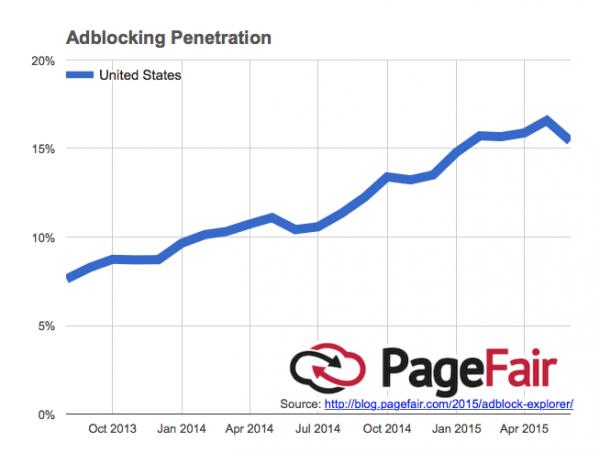[a]listdaily reported earlier in the year about the rise in ad blocking services, and how they are concern to marketers and companies alike. The issue continues to grow, as new numbers indicate that ad blocker usage is growing faster than ever among Internet users, even on mobile.
Now the IAB has changed their tune about ad blocking. “We messed up,” said Scott Cunningham, senior vp of technology and ad operations at the IAB. “Looking back now, our scraping of dimes may have cost us dollars in consumer loyalty.” He goes on to say how not focusing on the user has directly impacted the rise of ad blocking. “The fast, scalable systems of targeting users with ever-heftier advertisements have slowed down the public Internet and drained more than a few batteries. We were so clever and so good at it that we over-engineered the capabilities of the plumbing laid down by, well, ourselves. This steamrolled the users, depleted their devices, and tried their patience.”
PageFair recently posted a series of startling numbers, in partnership with Adobe, that show just how much ad blocking is being used these days. The full report can be found here, but here’s the quick rundown.
- Ad blocking is set to cost publishers nearly $22 billion for this year alone.
- There are now almost 200 million active ad blocking users around the world. Right now, it sits just at 198 million.
- Ad blocking has grown over 41% around the world over the last year.
- U.S. ad blocking grew 48% in the last 12 months, leading up to June 2015. The total number of active users is 45 million.
- U.K. ad blocking grew even higher, by 82%, to 12 million active users for the same time period.

The chart breaks down just how much ad blocking has grown in the U.S. alone, going higher in penetration over the past two years by nearly double the count.
This is a cause of concern for many companies, including many of the bigger ones working their way around the market. As noted by AdWeek, YouTube has been fiddling with an ad-free subscription service to counter the many users that have been utilizing ad blocking software.
But Zack Sinclair, CEO of FairBlocker, states that YouTube is its own problem in that regard. “A lot of people blame YouTube for ad block usage,” he said. “Display ads are easy to ignore. On YouTube, you see exactly how much time is being wasted.”
Adblock Plus, AdGuard and uBlock have thrived as a result of users wanting to block these ads, although it’s leaving quite a dent in big business. Especially considering that digital video advertising has increased by almost 60% for this past year. But with almost 150 million people having some form of ad-blocking software, companies are scrambling for solutions.
Not everyone thinks that YouTube’s proposed subscription plan is a good idea, particularly Frederic Montagnon, CEO of Secret Media. “What I don’t understand, actually, is that today, for someone using ad blocking, they don’t see any ads, so they won’t see any reason to pay YouTube – or anyone – to prevent being exposed to them,” he explained.
A report from Montagnon’s company indicates that only two percent of Internet users would be willing to pay for the subscription plan to access online services, which is far from encouraging.
There is some question in terms of users blocking such ads and possibly doing harm to companies, but that isn’t stopping them from subscribing, according ad block user Ian Evans, who explains the benefits in a recent blog post. “I first began using AdBlock primarily because of YouTube,” he explained. “Before every movie trailer, every music video, every episode of Crash Course and every 90-second cat video, I had to watch a minute-long advertisement. Sometimes I could click past it after 30 seconds, but increasingly, I couldn’t. Sometimes it was longer than the video itself.”
Even Apple is taking preventive measures, recently blocking the iOS ad blocking app Been Choice from sale on the App Store, according to Business Insider. The app’s co-founder, Dave Yoon, believes it could return, but ad blocking may have put the company into a “conundrum” in terms of user privacy and the customer’s choice to use such an app.
Apple’s statement the matter is, “Apple is deeply committed to protecting customer privacy and security. We’ve removed a few apps from the App Store that install root certificates which enable the monitoring of customer network data that can in turn be used to compromise SSL/TLS security solutions. We are working closely with these developers to quickly get their apps back on the App Store, while ensuring customer privacy and security is not at risk.”
However, the question of whether they can still effectively be used for ad blocking has yet to be seen.
“They can’t let us in if we block in-app ads and iAds, could they ” Yoon asks. “We obviously don’t win by putting the biggest and arguably the best-loved company in the world in a conundrum. So we need to work with them.”
“We need to get back to the App Store without this stopping us since we’re trying to be more than an ad blocker.”

